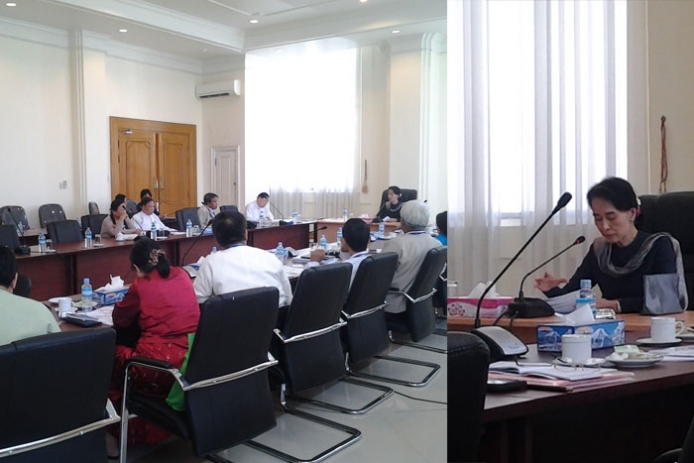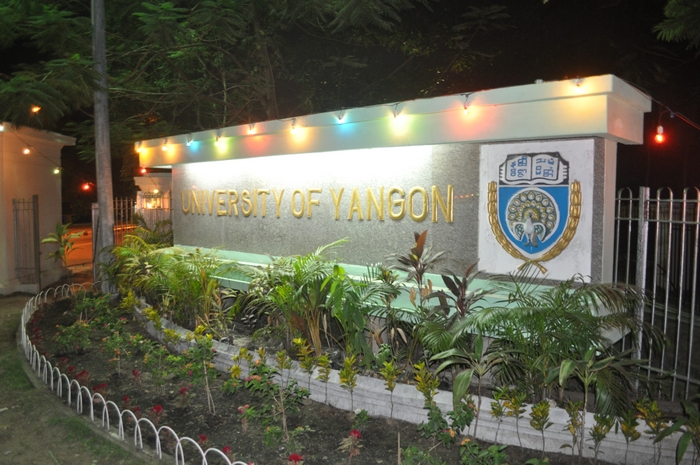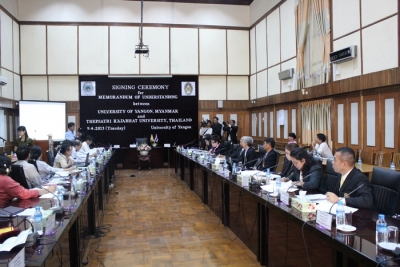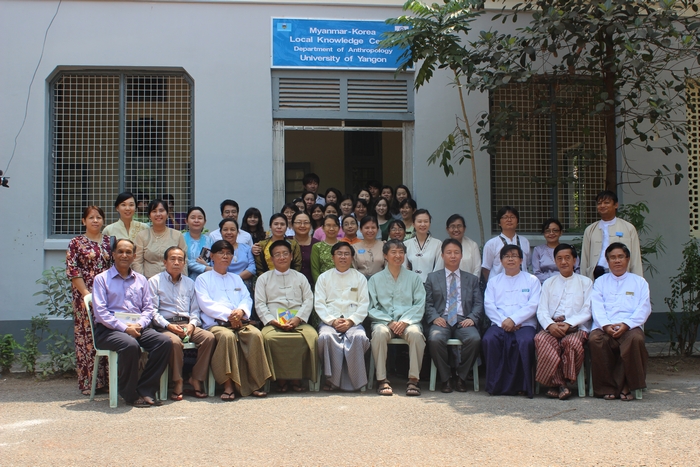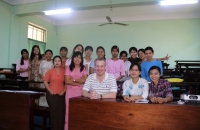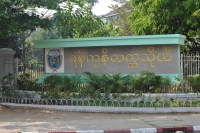
General (10)
"The Meeting of the Committee on Renovation and Upgrading the University of Yangon was held at Nay Pyi Taw, at (I-12), Hluttaw Building on 9.10.2013."
By yufundeditorAGREEMENT ON ACADEMIC EXCHANGE AND COOPERATION
BETWEEN
YANGON UNIVERSITY, MYANMAR
AND
NAGOYA UNIVERSITY, JAPAN
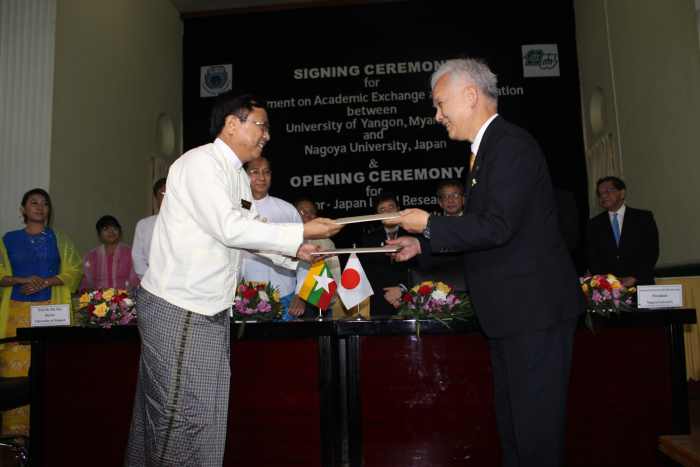
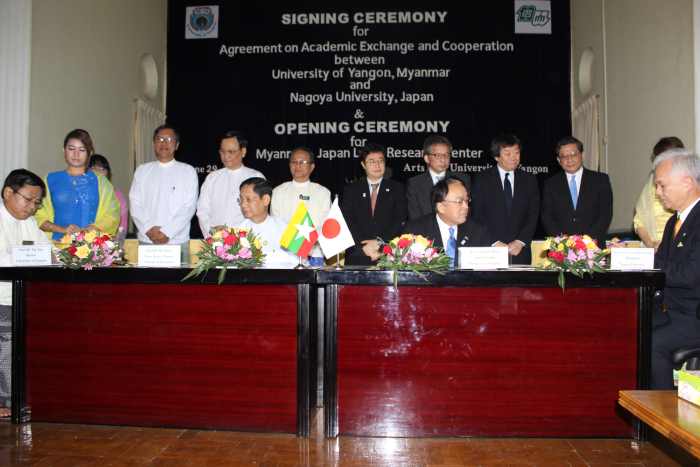

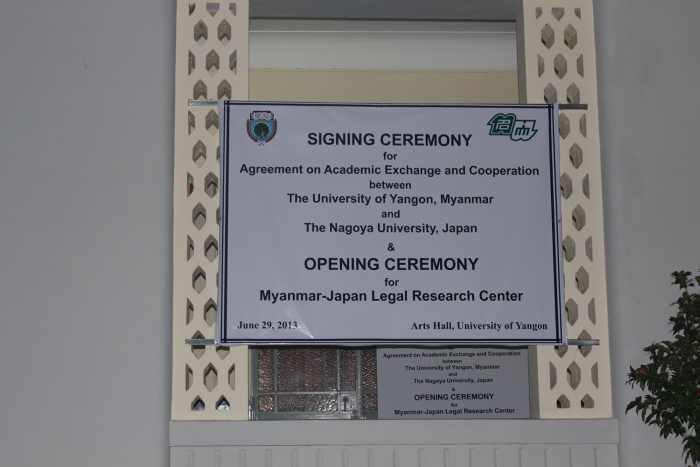
SIGNING OF MEMORANDUM OF AGREEMENT
BETWEEN THE UNIVERSITY OF YANGON, MYANMAR
AND
THE KOREA FOUNDATION FOR ADVANCED STUDIES
JUNE 13, 2013
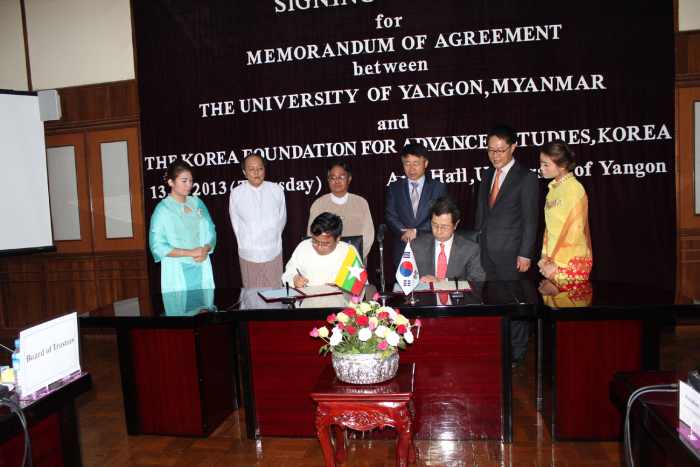
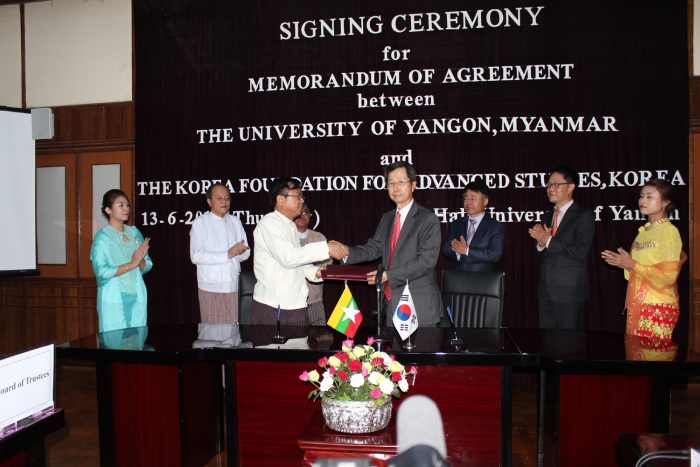
MEMORANDUM OF UNDERSTANDING
ON COOPERATION AND ACADEMIC EXCHANGE
BETWEEN
UNIVERSITY OF YANGON, THE REPUBLIC OF THE UNION OF MYANMAR
AND
THEPSATRI RAJABHAT UNIVERSITY, THE KINGDOM OF THAILAND
The Rector of University of Yangon, Republic of the Union of Myanmar, and the President of Thepsatri Rajabhat University, Kingdom of Thailand, signed MOU on cooperation and academic exchange between the two universities on 9 April 2013. The two Universities agreed to encourage and promote academic and scholarly activities .These activities include exchange of faculty and staff members, exchange of students, exchange of publications and relevant academic and scholarly information, joint research, lectures and symposia and other activities that are deemed appropriate by mutual consent.
MEMORANDUM OF UNDERSTANDING
BETWEEN
HANKUK UNIVERSITY OF FOREIGN STUDIES, THE REPUBLIC OF KOREA
AND
UNIVERSITY OF YANGON, THE REPUBLIC OF THE UNION OF MYANMAR
The Hankuk University of Foreign Studies and the University of Yangon signed MOU on cooperation through both educational and academic exchanges. The two Universities have agreed to include the following educational and academic exchanges:
- development of mutually beneficial academic programmes and courses;
- exchange of academic staff for the purpose of teaching and conducting research;
- reciprocal assistance for visiting academic staff and students;
- coordination of such activities as joint research, lectures and training;
- exchange of documentation and research materials in the fields of mutual interest, provided that, to the best knowledge of the respective institutions, there is no prohibition by law or otherwise against the exchange; and
- exchange of students for study and research.
The International Center of Excellence at Yangon University (ICOE)
By Super UserThe International Center of Excellence at Yangon University (ICOE) was founded on 10 January 2013 in collaboration with the Ministry of Education of the Republic of the Union of Myanmar.The ICOE as the primary center designated by the Myanmar government for post-graduate education in Lower Myanmar, the ICOE facilitates student and faculty development and collaborative research opportunities.
ICOE has an Advisory Board. Members of the Advisory Board are representatives from the Office of the President of Myanmar, the Ministry of Education and Yangon University; Professor Karl Jackson and Dr. Jae Ku of SAIS, Johns Hopkins University; professors from Chang Ang University; and leaders from Myanmar.
The Ministry of Education is in the process of refurbishing the Science Building on the Yangon University campus to house the ICOE. The ICOE building will serve as an incubator for other international inputs to higher education, offering under its own authority, office space and teaching facilities to incoming programs.
The ICOE will offer courses to current faculty and graduate students and to seek funding to send junior faculties abroad for training. Initial courses and workshops sponsored by the ICOE will concentrate on public policy and political economy as well as workshops in law, technology, and medicine.
In the spring of 2013, the International Center of Excellence at YU began course instruction in International Relations and Development. On January 21, 2013, a SAIS/Chung Ang University-organized and KOICA funded collaboration of American and Korean university professors been teaching a series of sixteen graduate level courses in “International Relations and Development Studies“ at Yangon University.
The ICOE will encourage joint research projects between visiting scholars and faculty and graduate students from selected departments of Yangon University as well as other universities affiliated with ICOE.
A sample of the courses to be taught over the next year include: International Relations; Principles of Economics; the Asian Growth Model; International Security, and Foreign Policy Analysis.
The ICOE is an open-architecture designed to attract different universities, private companies, foundations, and NGOs bound together only by the desire to increase the quality of higher education in Myanmar.
A. Visiting Fellow Program
- 6 to 12 scholars to IR, Law and Archaeology Departments, supported by Open Society Foundations (for 2 weeks)
- One professor to Geology Department supported by AUN-SEED/Net (for one month)
- Visiting Professor from Cologne University, Germany to Geography Department, supported by DAAD (for one and a half year)
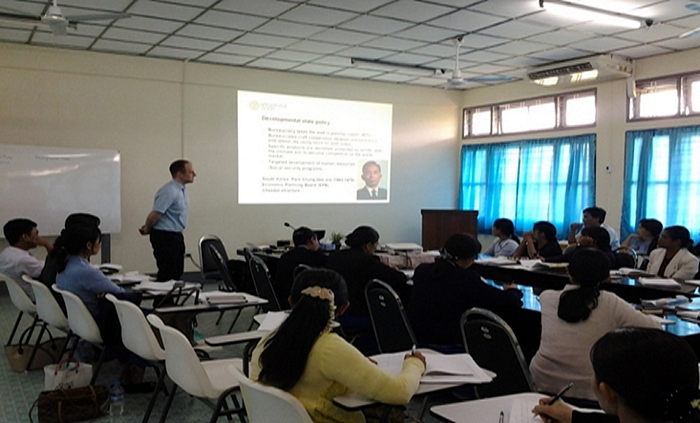 Visiting Professor Program under the sponsorship of Open Society Foundations for upgrading teaching skills for IR staffs (Professor Wolfram Schaffar, Institute of Development Studies, University of Vienna at Department of IR)
Visiting Professor Program under the sponsorship of Open Society Foundations for upgrading teaching skills for IR staffs (Professor Wolfram Schaffar, Institute of Development Studies, University of Vienna at Department of IR)
B. Long-Term Collaboration Program
- University of Yangon is member of ASEAN Universities Network (AUN)
- AUN-QA Training and implementation
- AUN/SEED-Net Scholarship
- Collaboration between University of Yangon and Johns Hopkins University, US & Chung Ang University, Korea (Supported by KOICA)
- One year training on "International Relations and Development"
- Collaboration between Anthropology Department, University of Yangon & Hanyang University, Korea (Supported by KOICA).
- Local capacity development project for inclusive development in Myanma (for one – two years )
- Establishment of Korea – Myanmar Local Knowledge Center
- Collaboration between Law Department, University of Yangon & Nagoya University, Japan.
- Establishment of Japan Myanmar Legal Research Center
C. MoU with UY
- Thepsatri Rajabhat University, Thailand (9-4-2013)
- Hankuk University, Korea (3-5-2013)
- Korea Foundation for Advanced Studies (KFAS) (12-6-2013)
- Nagoya University, Japan
- Australia National University
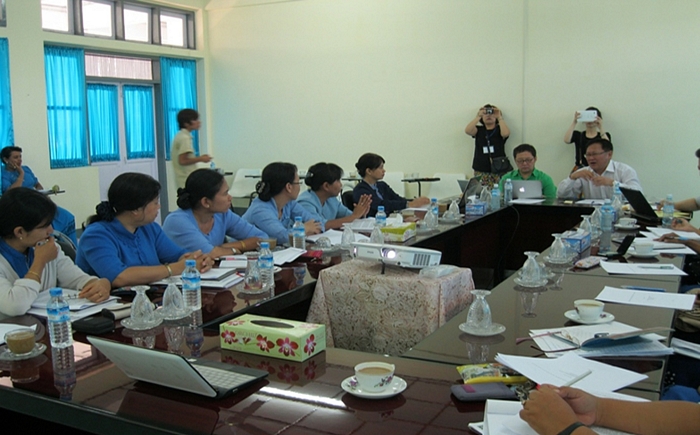 Joint Seminar with Korea on “ Myanmar-ROK Perspective on Rise of China”
Joint Seminar with Korea on “ Myanmar-ROK Perspective on Rise of China”
D. to establish e-Library by the support of OSF
- i) Phase I
- The 1st step will be providing a starting package for 3 yrs
- To commence mid June, 2013 for all Myanmar Universities
- ii) Phase II
- Establishment of e-library by the support of OSF
- Based on the report of expert team of Cornell University
CONTINUING THE PROUD TRADITIONS INTO THE NEW CENTURY
Historical Background
The University of Yangon is one of the historic places of Yangon. Located on a large plot of land measuring 200 acres on the banks of the Inya Lake, the Yangon University Campus is bounded by Pyay Road, University Avenue and Inya Road. Originally, this land was a densely forested but a very scenic area beside the Inya Lake. It is a peaceful and tranquil place with the right atmosphere to induce high academic achievements. Even now the campus is a green oasis with towering trees and beautiful flowering shrubs, singing birds and darting butterflies. Lecture halls, students' hostels and senior houses of staff's stand inside landscaped gardens and students stroll along shaded tree-lined walk ways.
During the early years of the British colonial rule, the University was first set up as an affiliated college of Calcutta University (now Kolkota). But by the year 1878, Intermediate of Science and Arts level courses were given by staff members of the College whom were recognized by the London University. The Yangon University Act of 1920 was later promulgated and established Yangon University as the only University in Myanmar .It has since become the paramount centre of higher education in the Republic of the Union of Myanmar.
After the country's Independence, the original Act was amended in 1949. Under this new Act the University of Yangon was composed of the Faculty of Arts, the Faculty of Science, the Faculty of Law the Faculty of Forestry, the, Faculty of Education, the Faculty of Engineering and the Faculty of Agriculture. The government promulgated a new Myanmar University Law and introduced a new system of education in 1964. University of Yangon was transformed into a centre of learning in the fields of arts, science, social science and humanities. The other vocational faculties became separate and independent degree-conferring institutions.
Present Day University of Yangon
In 1999 University of Yangon was reorganized as the centre for post-graduate studies in Myanmar. Credits and semester system were introduced for each academic year with the aim to attain the highest national and international educational standards. An academic year has two semesters. The first semester is from June to September and the second is from December to March. Master of Research (M. Res) and Doctor of Philosophy (Ph. D) degrees, in both the Arts and Science subjects, are now awarded to successful and outstanding students.
The University of Yangon is headed by a Rector, who is responsible for both the academic and administrative functions of the institution and accountable to the Department of Higher Education (Lower Myanmar) under the Ministry of Education. There are also three Pro-Rectors who act as his deputies. A Senate, composed of Professors/Heads of Departments of the teaching departments, is responsible for maintaining the highest standard of academic education for the students, reviewing the results and making necessary recommendations. Administrative matters are coordinated by the Administrative Board chaired by the Rector.
Every academic department has two Professors, with one as ex-officio Head of Department, and four Associate Professors plus lecturers, assistant lecturers, demonstrators/ tutors as necessary. University of Yangon has 20 teaching Departments.
The Teaching Departments are:
- Anthropology
- Archaeology
- Botany
- Chemistry
- Computer Science
- English
- Geography
- Geology
- History
- Industrial Chemistry
- International Relations
- Law
- Library& Information Studies
- Mathematics
- Myanmar
- Oriental Studies
- Philosophy
- Physics
- Psychology
- Zoology
With the introduction of the new scheme of reorganization to become the University as a unique centre for post graduate studies, it was able to confer the first Ph.D degree in 1997.
Since its establishment in 1920 the University of Yangon has provided the young Myanmar nationals with a high standard of education needed to face the challenges of the world. It has prepared the students to confidently face life. These aims have been successfully realized. It has produced world-renown scientists and educators who have gained respect and prestige in many international organizations, not least in the various agencies of the United Nations Organization. Even now many of the Yangon University's graduates are excelling in their chosen fields both abroad and in-country. Many foreign educational institutions and educationists has also acknowledged the high caliber of instruction and the facilities of the University. Consequently the University has been able to sign many Memorandums of Understanding (MOU) with foreign universities and institutions of higher education. This has further strengthened the University of Yangon's leadership in the academic field. Many foreign NGOs have on-going field expeditions and research projects together with the various departments of the University.
It is also a proud member of the ASEAN Universities' Network (AUN). Not only in the education sector but also in many other sectors of human activities the Yangon University graduates has proved their high caliber of competence. There are sport personalities, there are famous entertainers and there are even movie stars. There never has been any gender discrimination. The majority of the students in many disciplines are girls. Most Professors and Heads of the Teaching Departments are also ladies. Graduates of both genders from the University has achieved high positions commensurate with their academic backgrounds, be it in the public or the private sector, based entirely on their own merit. Religion is also no obstacle for getting an education at the University of Yangon. The academic staff come from various religious backgrounds. Students from assorted religious faiths are friends during their student life and stay life-long friends even when the University days are over. The Yangon University also is a meeting place for our cousins from many different national groups living in the country. They come from the delta, they come from the plains and they come from the mountains. Many are from remote small villages and some are from big towns. Some may be rich but others are from simple ordinary families. But from wherever they arrive, whatever their backgrounds they are all welcomed as students of the Yangon University.
The University of Yangon has maintained proudly throughout its history a reputation as a grand institution providing a high caliber of knowledge and education. Matured and experienced the University of Yangon is even more ready now to face the challenges of the new knowledge-based age. This is the mission it will continue into the 21st century.
